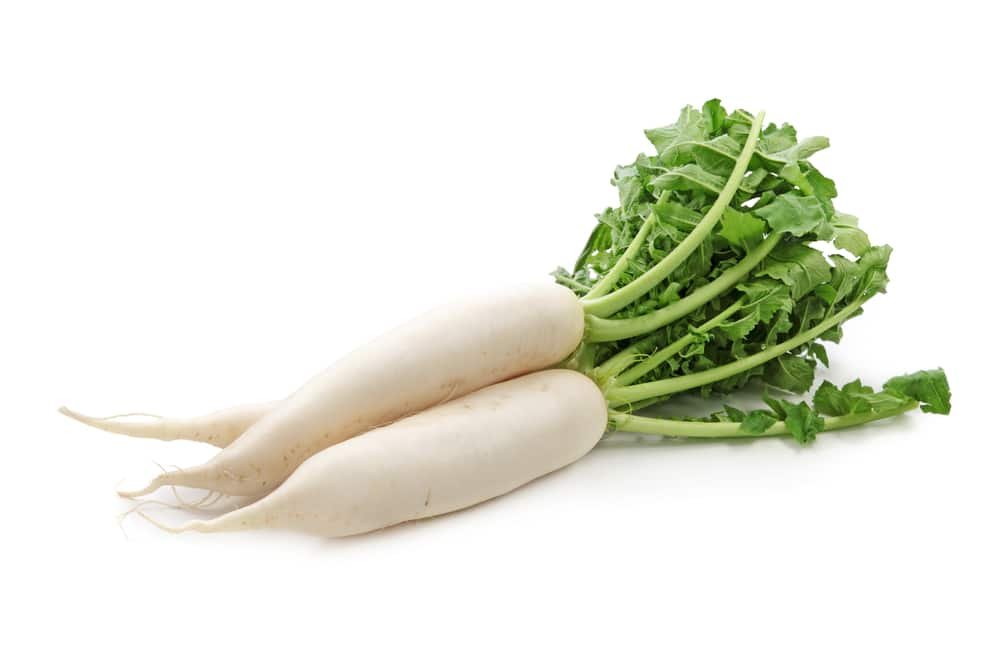Daikon health benefits includes promoting respiratory health, promoting digestion, supporting kidney function, reducing cancer risk, boosting immunity, lowering sugar level and maintaining blood pressure levels. Other benefits includes increasing blood level, preserving brain and nervous system, promoting healthy pregnancy and supporting bone health.
What is Daikon?
When most people think of radishes, they imagine reddish or pink bulbs, but then there’s the Daikon Radish– one resembling a white carrot instead. Also referred to as the Japanese, Chinese or Oriental radish, the Daikon has a mild taste compared to the typical red radish.
All varieties of radish, Including the Daikon, are members of the family raphnus, historically originating in south East Asian regions. They then spread to Europe, who subsequently introduced it to the Americas.
Radishes are extremely helpful to our overall health, possessing a number of benefits that can benefits anyone who consumes them. Extremely low in calories, the Daikon’s mild taste makes it an easy inclusion in numerous meals, so that you can consume more without much of a hassle.
Nutrition Info (per 100g serving)
Calories-18
Total Carbohydrate -4g
Dietary Fiber -1.6g 6% RDA
Sugars-2.5g
Vitamin C-22mg 37% RDA
Folate-28.0mcg 7% RDA
Calcium -27mg 3% RDA
Iron -0.4mg 2% RDA
Magnesium -16mg 4% RDA
Phosphorus -23mg 2% RDA
Potassium -230mg 6% RDA
Copper -0.1mg 6% RDA
11 Amazing Health Benefits of Daikon

1. The Daikon Radish Promotes Respiratory Health
The daikon radish possesses anti-bacterial and anti-viral properties, which make it excellent for maintaining the health of the respiratory tract and lungs. Infections caused by bacteria or viruses typically result in increased mucus production, which can obstruct the airways and make breathing difficult. This happens especially in asthmatics or people who suffer from chronic allergies. Daikons also contain bioflavonoids, which are substances related to Vitamin C that boost lung function and reduce the incidence of asthma attacks.
2. Daikon Radish Consumption Promotes Digestion
When we eat, the food needs to be broken down by a variety of enzymes starting in the mouth. Daikon radishes contain enzymes such as amylase and protease, which promote breakdown of carbohydrates and proteins especially. The daikon also contains other enzymes which assist with fat breakdown, making it an excellent food to consume especially in persons with impaired digestive abilities. Daikons are also rich in fiber, which is extremely beneficial in maintenance of healthy bowel function and constipation prevention, helping retain water in stool and bulking matter so it transits easily through the digestive tract.
3. Daikon Radishes Promote Healthy Kidney Function
The kidneys are essential to filter blood, recycling water and important nutrients back into circulation so they can be used again. Its other essential trait is in excretion of water soluble waste via diuresis, or the process of urination. Under certain conditions, the kidneys fail to process enough fluid, a condition known as reduced filtration rate. In such cases, uses of external foods and medication that promote urination are necessary. Daikons help to naturally stimulate diuresis, preventing accumulation of waste in the kidneys where they can form painful renal stones.
4. Daikon Consumption Can Help Reduce Cancer Risk
Daikon radishes have been studied for their role in cancer prevention, especially when it comes to stomach cancer. In particular, Daikons are good at eliminating nitrosamine compounds, highly carcinogenic nitrogen based molecules that are the byproducts of consuming smoked food. Daikons also have numerous pother phenolic compounds that boost general cancer resistance and reduce the effects of free radicals on cells.
5. Daikon Radish Consumption Boosts Immunity
Immunity is a multi-faceted defense mechanism, including specialized white blood cells, and reducing the body’s susceptibility to illness. Daikon radishes are rich in vitamin C, one of the best immune boosting nutrients. Increased consumption of vitamin c is associated with increased white blood cell production, in addition to enhanced anti-oxidant actions. Oxidation damages DNA and can result in production of defective cells, which have the potential of turning cancerous. Speed and healing of wounds and infections is also increased, so that the typical duration of illness is shortened and risk of severe infection minimized.
6. Daikon Are Diabetic Friendly
Daikons are extremely low carbohydrate vegetables, which can easily be incorporated as a diet choice for diabetics. Daikons will not spike blood sugar, and its high fiber content more than justifies its importance as part of a diabetic friendly diet. Combined with other food, Daikons slow down absorption of sugars and keep insulin stable. This is key in achieving diabetes control and not result in diabetic complications occurring.
7. The Daikon Radish Helps Maintain Blood Pressure Levels
Daikons contain potassium, a mineral important in the regulation of blood pressure and blood vessel health. Sodium has a constricting effect on blood vessels, causing blood pressure to increase. Potassium helps blood vessels to relax and balance the delicate fluids in our blood. Potassium also assists in removal of excessive water via the kidneys, which ultimately preserves normal blood pressure as well.
8. Daikon Is A Blood Building Food
Blood building is not as straight-forward as people may believe, as it requires the participation of various vitamins and minerals for it to occur. Among these are iron and copper, which Daikon contains in moderate amounts. Daikons can also help prevent anemia, and may improve energy levels from enhanced oxygen supply to cells and energy metabolism. Daikons can be especially useful to women who lose blood every month during their menstrual cycle.
9. Daikons Help Promote Healthy Pregnancy
Folate is one of the most important nutrients to ensure a healthy pregnancy, with a single daikon root supplying approximately ¼ of your recommended intake. Folate is a superior source of this vitamin that compared to synthetic folic acid, as it gets converted more efficiently into an important metabolite, and also poses a significantly lesser risk of becoming toxic. Consuming a variety of vegetables remains the best way to meet this daily requirement, as it may be impractical to eat Daikons every single day.
10. Daikon Preserves Health Of The Brain And Nervous System
The nervous system, and especially the brain can be degraded by the effects of excessive stress and oxidation. One such compound that is produced via these processes is homocysteine, which can kill brain cells and hasten the road to premature cognitive decline. Folate breaks down homocysteine into the harmless methionine, an amino acid that has numerous functions. Deficiency of folate can be felt from a young age in the nervous system, affecting the development of the unborn child as well- the reason it is necessary during pregnancy. Regular consumption of daikon will help you meet your folate requirements, and reduce the risk of neurodegenerative diseases such as Alzheimer’s and Parkinson’s from occurring.
11. Daikons Can Help The Bone Building Process
Daikons are not rich in the bone building nutrients by any means- but organic Calcium and other nutrients can still go a far way in helping you meet your requirements. The number of people that do not get sufficient calcium in their diets in staggering, so every little bit helps. Ensuring your get sufficient bone friendly nutrients in your diet can help you prevent osteoporosis as you age. This will facilitate greater mobility and reduce the risk of fractures and subsequent decreased quality of life.
Conclusion
Getting more daikon radishes in your diet should be easy, as their mild taste and texture make them quite versatile. They are low calorie, so if you enjoy them feel free to have a generous portion to satisfy your hunger. The nutritional profile and health benefits offered by them make them warrant their inclusion, so don’t miss out on this awesome vegetable and all it has to offer.
Join the 7‑Day “Better Gut” Plan
Pop in your email and we’ll send Lesson 1 + the printable list.







